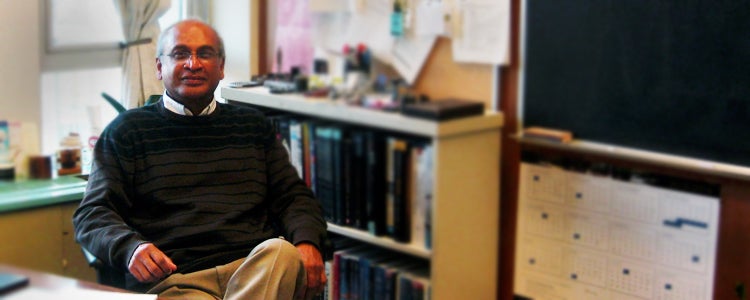Rohan Jayasundera: Great Expectations
 |
| Rohan Jayasundera, Department of Physics and Astronomy |
(Update: Rohan has now retired from the University of Waterloo)
In 1987, Arthur Chickering and Zelda Gamson, with the assistance of other experts in higher education, identified what they called “Seven Principles for Good Practice in Undergraduate Education.” There’s little doubt that all seven of these principles are enacted by Rohan Jayasundera – a recipient of Waterloo’s Distinguished Teacher Award – but one principle in particular stands out: namely, high expectations. “I don’t believe in making life easy for students,” says Jayasundera. “I don’t think that giving easy midterms or assignments is the way to motivate them. They come to university to study something. They are here because they want to be here. They need to be challenged.”
Perhaps because he is a physicist, Jayasundera is also keenly aware that for every action there is an equal and opposite reaction: he knows that if he is going to have high expectations of his students, then he in turn needs to be there to support them. “To challenge them,” he says, “I have to demand hard work from them, and if I demand that then I have to be available to them. So, my door is open for students anytime.” Jayasundera means what he says. On weekdays he meets with students in his office until evening, and again on Saturdays for half a day.
Students recognize – and appreciate – both Jayasundera’s high expectations of them and his corresponding dedication to them. “He's tough,” says one student “but he goes out of his way to make sure each and every one of his students succeeds.” Another student comments that “All the extra time he spends with the students is incredible. He’s a very devoted teacher, and always willing to help you understand everything he teaches.” A third student sums up Jayasundera’s instructional approach this way: “He doesn’t have office hours – because his office is never closed!”
After 31 years of teaching at Waterloo, how does Jayasundera maintain this level of dedication to his students? The answer perhaps lies in what he identifies as his teaching philosophy: “If you enjoy what you do, you’ll do a good job; if you do a good job, your students benefit; if your students benefit, they are happy; if they are happy, they love you; if they love you, then it helps you enjoy what you do – and back to square one!” The word “love” might seem surprising in an academic context, but Jayasundera uses it very intentionally: he emphasizes that “if you don’t love your students and love what you are doing, then you don’t succeed.” His ardor for his students and his discipline is infectious. “He makes his students fall in love with physics,” says one of them. “He loves to teach and loves to help,” says another. “I’m going to miss him,” says a third, as the course draws to an end.
Jayasundera’s high expectations – of his students and of himself – are at the heart of his teaching practice, and are also what made him a natural choice for the position of Senior Teaching Fellow in the Faculty of Science. In that role, he recognizes that there is no single template for good teaching. “Every instructor,” he says, “has to find a teaching style that suits his or her personality.” Still, if one is looking for a role model, Rohan Jayasundera is hard to beat.
Rohan Jayasundera was interviewed by co-op student Sophie Twardus, Special Projects (Teaching Stories), CTE.
Read more Teaching Stories
Tip sheets
CTE has developed more than 100 Teaching Tips. Each one is a succinct document that conveys useful ideas and practical methods for effective teaching. Some of the Teaching Tips that are relevant to the strategies mentioned in this Teaching Story include the following: